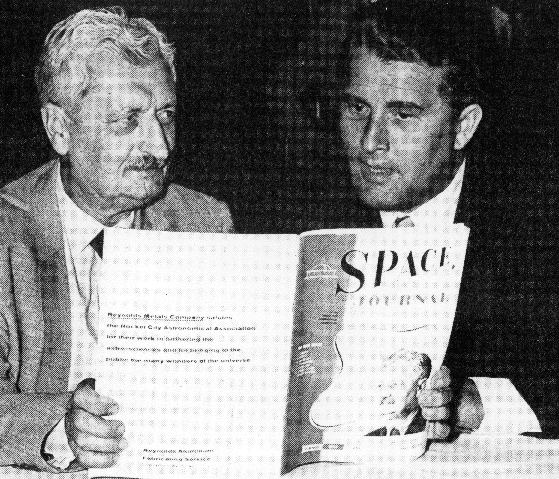

Professor Hermann Oberth, the "father of space flight" with his most famous disciple, friend and colleague--the legendary Wernher von Braun.
Space is a challenge to our curiosity, imagination, and vision. Space excites the curiosity, for it holds secrets of the creation of the universe--and life itself. It contains knowledge which man must have to understand basic forces of nature.
Space staggers the imagination with its endless immensity and majestic, awesome wonders.
Space stimulates the vision as it expands our comprehension of a realm which, since the beginning of time, has generally been left to the vagaries of mystery, superstition, and speculation.
And the effort to fathom its mysteries will test the mettle of our science and technology.
America has accepted the challenge of space exploration. The National Aeronautics and Space Administration has been given a firm mandate to explore, to observe, to understand, and to use the wonders and resources of this fascinating new environment.
In the first seven years of the Space Age, the United States has launched more than two-thirds of the satellites placed in earth orbit, photographed the moon from a distance of less than a mile, and taken a close-up look at Venus. We have spotted hurricanes as they formed, and watched historic news events as they happened a continent away, televised across oceans by remarkable communications satellites.
These achievements have been nothing short of fantastic. But they will be dwarfed by the magnitude of fabulous and exciting events that will occur in space within our lifetime.
One of the most significant milestones in space exploration will be manned lunar landing. I think none of us today can really imagine just how significant that day will be in the eyes of future generations. The nation with the vision, the capability, and the determination to land men on the moon will be recognized for its leadership as long as history is recorded. And the implications on current international prestige and influence cannot be minimized.
Success in space is equated in the eyes of many people with excellence in science and technology, economic strength, and determination of spirit. And this comparison, though over-simplified, is not too far afield. At any rate, its existence cannot be ignored.
Right now the environment of space has a certain amount of mystery, even an aura of magic, connected with it. This is caused largely by its unknown elements. We have always been fearful of the unknown.
Space is not hostile toward man. Hostility is willfully, deliberately directed by someone with the intellect and ability to act. Space is simply there, following the immutable laws of nature that govern creation. Neither is it hospitable. There is danger in space for man--if he ignores its laws. Just as there is danger for man on earth if he walks off a high cliff, stays out in the tropic sun too long when he is unaccustomed to it, or attempts to live in the arctic cold without adequate protection.
But man reacts to his environment, and adjusts to it. He has learned to live on earth without undue danger. And he will live in the environment of space, as he comes to know its characteristics better, and learns to use them to his advantage.
We need to dispel the mystery, take the "hex" out of space. And the only way we can do this is to get better acquainted with it by living and working there for extended periods.
NASA is developing true space faring capability for the United States. Project Apollo, the manned lunar landing program, is the focal point of this effort--not its ultimate purpose. The moon was chosen as a goal for manned space travel in this decade because its exploration will involve every facet of the nation's growing space capability. When our astronauts land on the moon, it will demonstrate our ability to sail on this new ocean.
When Lindbergh soloed across the Atlantic, Paris was his destination. But his objective was to demonstrate a transatlantic air capability. The moon is our cosmic Paris.
I firmly believe that we shall go on after Project Apollo is completed to explore the solar system. If we are to capture the reality of space, come to know it, and really use it, we must expose more people to space travel, for extended periods of time, and then apply what these people learn first hand in their new environment.
We are still very much in the earliest stages of space exploration and discovery. Our position today reminds me of an earlier period in the history of the Western World, the period when man first laid the great foundation, both in thought and achievement, for the better world we enjoy today. I speak of the Renaissance, the era of Michelangelo, Da Vinci, and Shakespeare. It was in this period, beginning in the fourteenth century, that man took terrific strides to emancipate himself from his environment. In this period he undertook in earnest the conquest of his home planet as a place of human habitat. This was the age when men summoned their courage and set out on the high seas to explore the earth. It was the age of Columbus, da Gama, Sir Francis Drake, and Magellan.
The Renaissance is often called the Age of Discovery. I believe we are entering the Second Great Age of Discovery, the exploration of outer space. To take part in that exploration is to take part in history during one of its great forward leaps.
© PROMETHEUS 121/2007
PROMETHEUS, Internet Bulletin - News, Politics, Art and Science. Nr. 121, July 2007